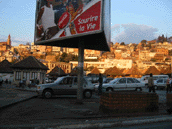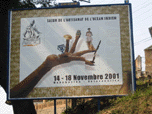 ECONOMY ECONOMY |
The winds of liberalization that blow over the Big Island have projected a more positive image of the country. "If we look over a ten years' period, I believe the situation has improved, but I regret that in these 10 years we have not gone any faster". This remark made by Mr. Naina Adriantsitohaina, President of the Union of Industries of Madagascar (Syndicat des Industries de Madagascar) describes the path undertaken by Madagascar. If we consider the reactivation of activities that are taking place all over the territory, we are far away from the clichés of misery and shortages, of the years of revolution and crises that left the economy exhausted. The productive sector is increasingly turning to foreign markets particularly due to the development of free-trade zones, shrimp companies and tourism. In 1990, the value of exported industrial products represented 20% of all exported goods. In 1999 it represented around 50%. Likewise, tourism has experienced considerable growth in 10 years. The number of non-resident tourists has increased by 16% per year between 1990 and 1999.

Today, with a growth rate of 6.7% confidence is back again even though improvements are not really felt on every-day life by most of the population. Time and perseverance are needed for the country to be able to go uphill. In fact in 1960, at the time of independence, Madagascar had a GDP of USD 350-500, rating among the top French ex-colonies together with Ivory Coast, Senegal and Gabon. Twenty years later, the Malagasy GDP fell below USD 200 per person, and the Big Island engrossed the group of the "fourth" world that encompasses the poorest countries of the planet. Despite the structural adjustment programs negotiated with Bretton-Woods institutions, the country hit rock bottom after the political crisis of 1991-1992 that held the economy hostage. The country did not stop sinking, finding itself at the very bottom of all ratings
According to the latest World Report on Human Development 2000, Madagascar holds the 141st position out of 174 countries worldwide. "The reforms the government has engaged have allowed for an economic growth larger than that of 1997-1999 (i.e. 3.7% in 1997, 3.9% in 1998 and 4.7% in 1999). The present situation of the country shows that the average annual income in real terms of Malagasy households has changed very little between 1993 and 1999, reaching 3.5 million in constant Francs (consumption prices have increased 204% in the same period). This information has been obtained from Madagascar National Report on Human Development 2000.
| 
Income per capita is lower than in the 1960's. "With a growth rate of 6.5%, we will need 30 years to reach the level of life we had 30 years ago", estimates Mr. Bruno de Foucault, President of the Groupement des Entreprises Franches et Partenaires (GEFP) who is a "zanatany" (a member of a family established in Madagascar for generations)
The gap between rich and poor is far from shortening. 10% of the population controls more than 80% of the country's wealth. The fight against poverty lies among the top priorities of the government and donors. "Our vocation is to fight against poverty. If you look at Madagascar's poverty figures, between 1993 and today, the amount of poor people in the cities has decreased from 70% to 50% of the population. At the same time, rural poverty has remained stable around 77%. Our first challenge is to help the country to fight against poverty and to develop rural areas" explains the local Operations Director of the World Bank, Mr..Hafez Ghanem, Even the private sector is participating, since the more private investment there is, the more chances there will be to fulfill a structural function of public interest.
Ready to grab any opportunities that come along, the key players of the economy were put to work. Madagascar has succeeded to stand out of the 35 countries benefiting from the African Growth and Opportunity Act (AGOA) , and managed to increase by 126% its exports to the USA over a year. Endowed with a great potential for development, this island-continent should expect a great future. "Maybe Madagascar is not an Eldorado, but there are not many countries that know growth perspectives similar to those that Madagascar foresees with the structural adjustment programs and poverty alleviation", explains Mr. Bertrand Coûteaux, Secretary General of the Groupement des Aquaculteurs et Pêcheurs de Crevettes de Madagascar (GAPCM). |

